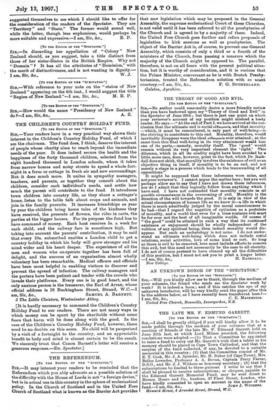THE THEORY OF GOOD AND EVIL.
[TO TUE EDITOR OP THE " SPEOTATOR."1 Sin,—No author could reasonably desire a more friendly review than you have bestowed upon my "Theory of Good and Evil" in the Spectator of June 29th ; but there is just one point on which your reviewer's account of my position might mislead a hasty reader. He says :—" At the end of Part I. we have arrived at the con- clusion that the ultimate end is social ebSagsov(a, and that morality —which, it must be remembered, is only part of well-being—is the striving to contribute to this end. Morality, therefore, would inevitably disappear were the ideal ebSati-Lovia ever attained ; at the same time this final well-being in its very attainment would lose one of its parts,—namely, morality itself. The good' would remain without its very important element the 'right.' This dilemma, which in all its crudity might have been avoided by a little more care, does, however, point to the fact, which Dr. Rash- dall does not skirk, that morality involves the existence of evil as an objective thing in itself, if morality is to be an end, and not merely a stage in a process which leads to the transcending of all oppositions."
It might be supposed that these inferences were mine, and not your reviewer's. I cannot argue the matter here ; but you will perhaps allow me to say that I have not drawn these inferences, nor do I admit that they logically follow from anything which I have said. I have not contended that morality consists ia all possible circumstances in the overcoming of evil. Morality is the direction of the will towards the good. It is only in view of the actual circumstances of human life as we know it—a life in which there is much admittedly judged by the moral consciousness to be bad—that I regard the negation of optimism as a postulate of morality, and a world that even for a time contains evil must be for ever not the best of all imaginable worlds. Of course if "the good" could be attained in such a way that its continued existence or enjoyment should be wholly independent of the volition of any spiritual being, then indeed morality would dis- appear. But such an eschatology is not mine. I do not under- stand an ultimate well-being which does not include social relations, social activities, love of some kind or sort. So long as there is evil to be removed, love must include efforts to remove this evil, but this need not necessarily be the case to all eternity. I do not of course pretend to have cleared up all the difficulties of this position, but I must not ask you to print a longer letter.






































 Previous page
Previous page